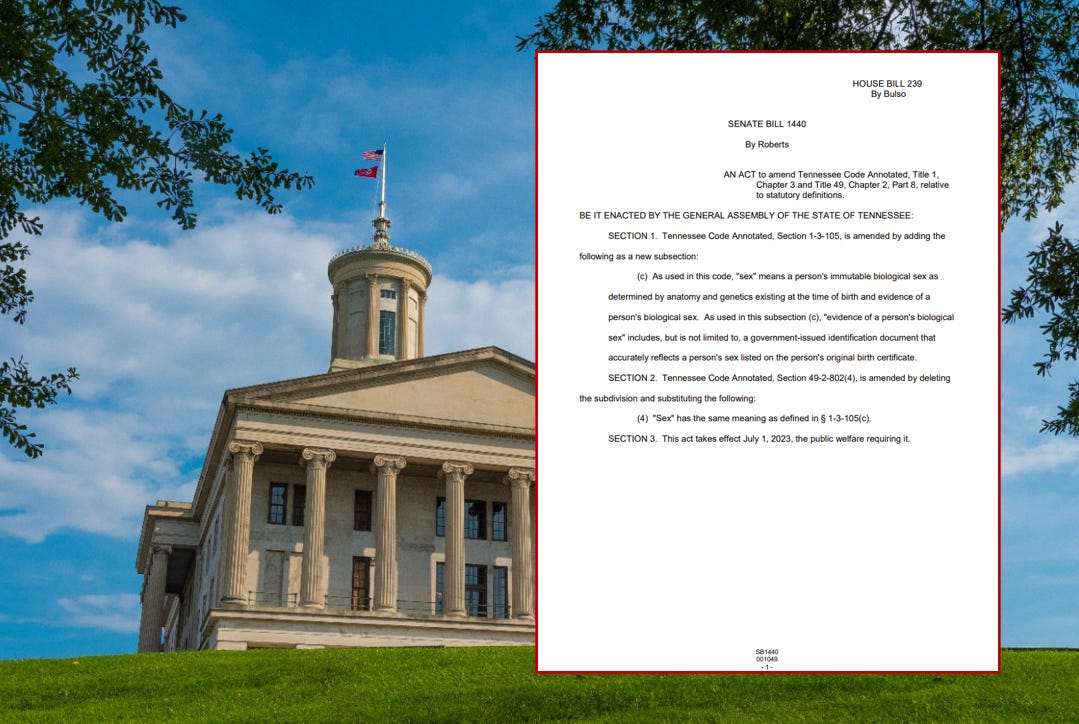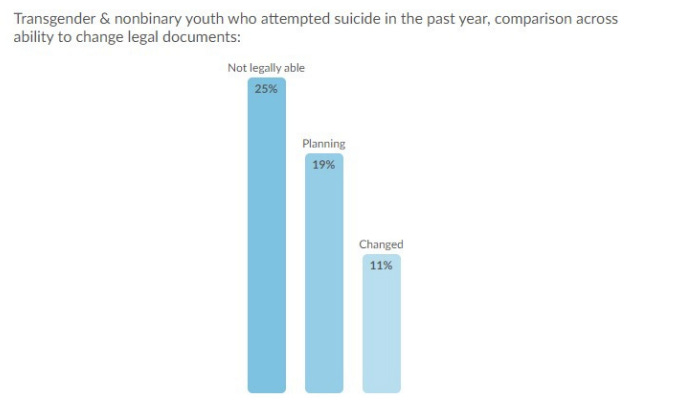TN Enacts Law Rolling Back Trans Rights, ID Changes, And Regressively Defines Sex
Tennessee's governor Bill Lee just signed into law a bill that would define sex to exclude trans people and require it on all legal documents. It is the 4th state to pass such a law.
Gov. Bill Lee enacted Senate Bill 1440 today, which redefines sex in Tennessee's legal code in a manner that excludes transgender individuals from legal protections. The bill stipulates sex as "immutable at birth,” and “defined by anatomy and genetics existing at the time of birth" under all state laws. The legislation could profoundly impact transgender residents, threatening their anti-discrimination protections and access to certain services like shelters. It also would mean that transgender people could not change their sex on their drivers licenses or birth certificates - something that every other state before this year allowed.
The actual bill is short - barely half a page - and presents a simplistic definition of sex. Proponents of the bill often suggest it "changes little" or merely "establishes a definition," yet for transgender individuals, this bill fundamentally alters their rights. Prior to its passage, gender markers on driver's licenses in Tennessee could be modified according to the National Center for Transgender Equality. Until today, changes required "a statement from the attending physician that necessary medical procedures to accomplish the change in gender are complete.”
This new definition of sex will be used across countless legal documents, the implications of which may not be fully realized for years to come. It's only through future court cases that the full impact of this new definition will be tested and understood. The newly implemented definition reads as follows:
There are clear and immediate problems with this definition of sex. It entirely excludes intersex people and does not provide any clarity on how intersex people should be treated under this law. Not all intersex conditions easily lean in a binary fashion. Some intersex conditions have both ovarian and testicular tissue present. Some intersex conditions, such as Mosaicism, can cause this. The law provides no clarity for the definition used for of these individuals.
The bill is also flatly discriminatory. Legal precedent exists protecting transgender people as covered under sex-based discrimination. The Supreme Court sided with transgender people in 2021 under the Bostock v. Clayton County decision. In Bostock v. Clayton County, which was heard over discrimination in employment law, the Supreme Court decided 6-3 with Neil Gorsuch writing the majority opinion that, discriminating against transgender people is sex discrimination: “When an employer fires an employee for being homosexual or transgender, it necessarily and intentionally discriminates against that individual in part because of sex.”
Gender marker changes are important for trans people. When stopped in an airport, when presenting your ID for age verification at bars, or when requested by police officers, having mismatched IDs can cause uncomfortable and sometimes dangerous situations. The 2015 US Transgender Survey reported that as a result of showing incorrect IDs, 25% of transgender people experienced verbal harassment as a result. You can see the results here:
Social transition is a major part of transition, and laws like this one in Tennessee target social transition. Changing legal documents in and of itself results in better mental health outcomes for trans people. A survey from the Trevor Project confirmed that gender marker changes and correct legal documents could reduce suicide risk by more than 50%:
Tennessee joins several other states that have passed similar laws recently. North Dakota and Kansas enacted comparable legislation earlier this year, with Kansas going a step further to restrict bathroom access for transgender individuals, although it lacks enforcement mechanisms for this provision. Similarly, Montana passed a law excluding transgender people from 41 sections of its legal code. This same law famously led to Rep. Zooey Zephyr being silenced, at which point she raised her microphone in a show of solidarity with protesters.
These recent laws clearly show an alarming trend that targets not only transgender youth and athletes, but also transgender adults. They insidiously strip away all legal protections and recognition for trans individuals. They also signify a sweeping societal setback - up until this year, trans people could have full legal recognition. By eliminating the ability to amend documents and stripping away anti-discrimination protections, these laws push transgender people towards precarious situations and effectively treat them as second-class citizens in comparison to their cisgender peers. Tennessee has shown disregard for these concerns this year, as it hastens to demote transgender citizens to that status.






I'm in NC and very scared about how little people are speaking out when the exact same things are happening here and we have a Desantis-like candidate running for governor. I might have to flee. :/
We want to share our appreciation again for your work, your steadfast dedication to getting the news right and out, so many folks depend on your sharp analysis....in these rough times you are the light.
- Team Trans Youth Equality Foundation